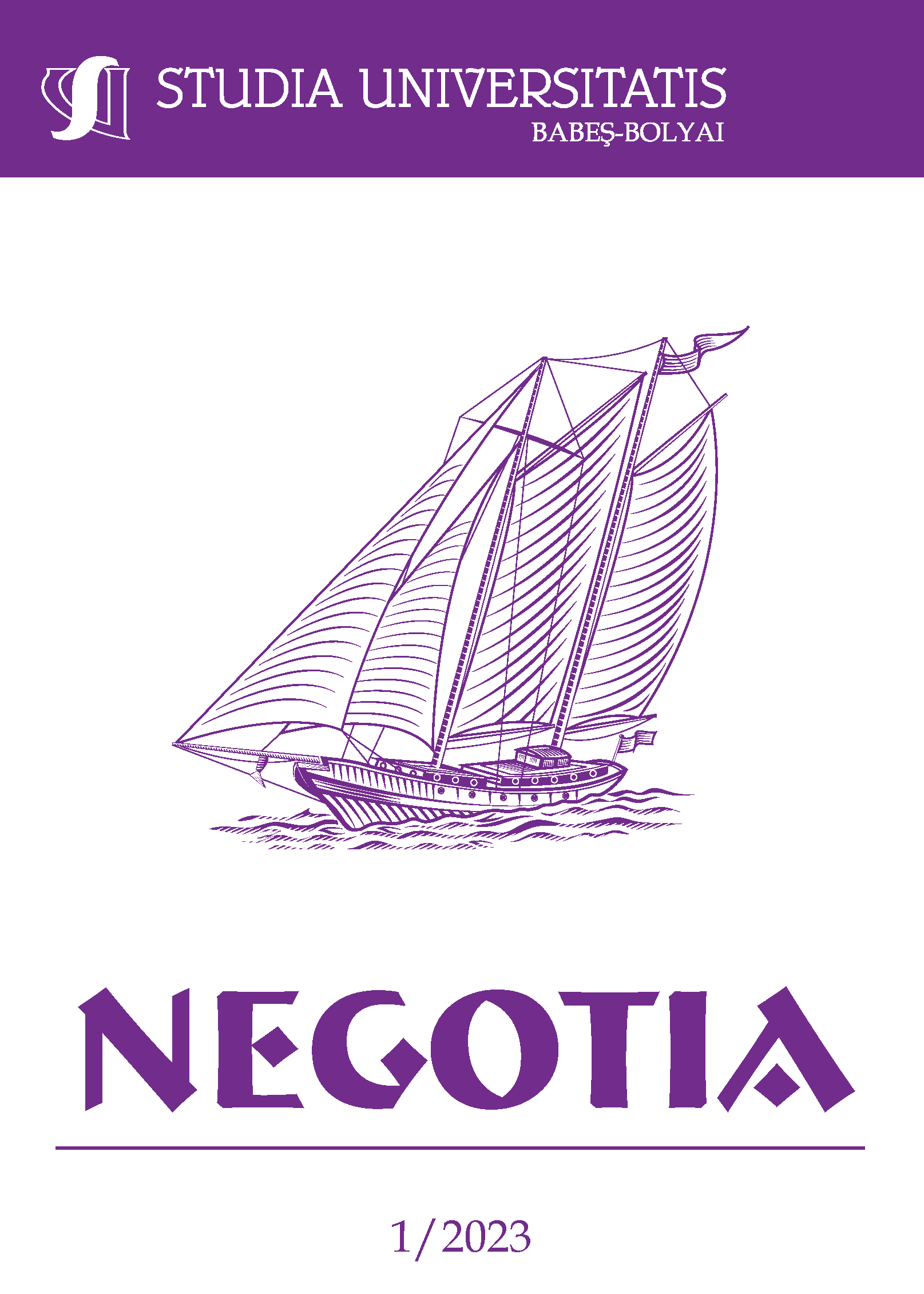HUMAN RESOURCES AS THE MAIN VECTOR OF COMMUNICATION: THE CASE OF MOBEXPERT GROUP
DOI:
https://doi.org/10.24193/subbnegotia.2023.1.03Keywords:
Mobexpert Group, communication, brand essence, employees, ownerAbstract
Owners and employees represent those stakeholders who substantially shape the organisational culture. In fact, their values, their expectations, significantly influence the company’s performance. Moreover, customers see a brand through its employees, through the owner. This paper has the following objectives: to explore the expectations/possibilities ‒ as basic pillars of an effective collaboration ‒ both from the point of view of the employees and from the point of view of the owner of the Mobexpert Group, and to identify those values that are appreciated by the employees of the Mobexpert brand, which also define the owner of the Mobexpert Group. In order to achieve the proposed objectives, content analysis was conducted based on the show Empire of Lions, Season 3, i.e. regarding the experiences and opinions of employees posted on YouTube (Mobexpert People section). Following the analysis, it was found that: (1) the success of the brand is summed up in the set of expectations, outlined values, (2) trust, self-confidence, perseverance and creativity representing the foundation/stone of the employee-brand relationship, and of possible collaboration between the owner of the Mobexpert Group as investor and potential business partners.
Article history: Received September 29, 2022; Reviewed January 30, 2023; Accepted February 17, 2023; Available online March 30, 2023; Available print April 30, 2023.
JEL classification: M31, O15
References
Abraham, S. (2012), “Job satisfaction as an antecedent to employee engagement”, SIES Journal of Management, Vol. 8 No. 2, pp. 27-36.
Brutu, M. & Mihai, D.M. (2015), “Research On Customer Satisfaction Degree at The Store Mobexpert Pitesti, In Order to Improve the Sales Results”, Annals of ‘Constantin Brancusi’ University of Targu-Jiu, Economy Series, No. 3, pp. 60-68.
Cahill, K.E., McNamara, T.K., Pitt-Catsouphes, M. & Valcour, M. (2015), “Linking shifts in the national economy with changes in job satisfaction, employee engagement and work–life balance”, Journal of Behavioral and Experimental Economics, Vol. 56, pp. 40-54.
Chanda, U. & Goyal, P. (2020), “A Bayesian network model on the interlinkage between Socially Responsible HRM, employee satisfaction, employee commitment and organizational performance”, Journal of management analytics, Vol. 7 No. 1, pp. 105-138.
Cmeciu, C.M. (2010), “Mobexpert-Reprezentări Semiotice ale unui Stil de Viaţă” [Mobexpert-Semiotic Representations of a Lifestyle], Acta Universitatis Danubius. Communicatio, Vol. 3 No. 1, pp. 162-166.
Dugguh, S.I. & Dennis, A. (2014), “Job satisfaction theories: Traceability to employee performance in organizations”, IOSR journal of business and management, Vol. 16 No. 5, pp. 11-18.
Gupta, M., Kumar, V. & Singh, M. (2014), “Creating satisfied employees through workplace spirituality: A study of the private insurance sector in Punjab (India)”, Journal of business ethics, Vol. 122 No. 1, pp. 79-88.
Ioras, C.F., Turnock, D. & Abrudan, I.V. (2006), “Restructuring the Romanian Wood Processing Industry”, Radovi Šumarskog fakulteta Univerziteta u Sarajevu, Vol. 36 No. 1, pp. 1-18.
Kurdi, B., Alshurideh, M. & Alnaser, A. (2020), “The impact of employee satisfaction on customer satisfaction: Theoretical and empirical underpinning”, Management Science Letters, Vol. 10 No. 15, pp. 3561-3570.
McEwen, W.J. (2008), Forța brandului [Married to the brand], Publisher ALLFA, București.
Meghișan, F. & Meghișan, G.M. (2007), “The marketing services on the furniture market”, http://mnmk.ro/documents/2007/2007-10.pdf
Militaru, G. & Şerbănică, D. (2008). “Competitive advantage by integrated e-business in supply chains: A strategic approach”, Annals of the University of Craiova, Economic Sciences Series, Vol. 7 No. 36, pp. 3196-3205,
https://www.mnmk.ro/en/documents/2008/2008-4.pdf
Moslehpour, M., Altantsetseg, P., Mou, W. & Wong, W.K. (2018), “Organizational climate and work style: The missing links for sustainability of leadership and satisfied employees”, Sustainability, Vol. 11 No. 1,
https://www.mdpi.com/2071-1050/11/1/125
Mugira, A. (2022), “Leadership Perspective Employee Satisfaction Analysis”, AKADEMIK: Jurnal Mahasiswa Humanis, Vol. 2 No. 3, pp. 127-135.
Olins, W. (2010), Despre brand [About brand], 2nd Edition, Publisher Comunicare.ro, București.
Randall, G. (2000), Márkázás a gyakorlatban [Branding in practice], Publisher Geomédia Szakkönyvek, Budapest.
Razak, A., Sarpan, S. & Ramlan, R. (2018), “Influence of promotion and job satisfaction on employee performance”, Journal of Accounting, Business and Finance Research, Vol. 3 No. 1, pp. 18-27.
Sageer, A., Rafat, S. & Agarwal, P. (2012), “Identification of variables affecting employee satisfaction and their impact on the organization”, IOSR Journal of business and management, Vol. 5 No. 1, pp. 32-39.
Saputra, F. & Mahaputra, M.R. (2022), “Effect of job satisfaction, employee loyalty and employee commitment on leadership style (human resource literature study)”, Dinasti International Journal of Management Science, Vol. 3 No. 4, pp. 762-772.
Simon, D.H., Gómez, M.I., McLaughlin, E.W. & Wittink, D.R. (2009), “Employee attitudes, customer satisfaction, and sales performance: Assessing the linkages in US grocery stores”, Managerial and decision economics, Vol. 30 No. 1, pp. 27-41.
Szász, Gy. (2022), On the trail of South Korean brands that conquer the world, Thesis, Faculty of Economics and Business Administration, Babeș-Bolyai University of Cluj-Napoca.
Törőcsik, M. (2006), Fogyasztói magatartástrendek [Consumer behavioural trends], Akadémiai Publishing House, Budapest.
Wampande, A.J. & Osunsan, O.K. (2020), “Employee attitude and customer satisfaction in selected hotels in Kampala, Uganda”, International Journal of Hospitality and Tourism Studies, Vol. 1 No. 2, pp. 144-150.
https://mobexpert.ro/pages/cariera-si-oameni, accessed on:14. 08. 2022
https://www.youtube.com/playlist?list=PLObl4r9vg6NHu6d1A833ETk03_wtIFJiR, accessed on: 04. 08. 2022 – 14. 08. 2022
https://www.youtube.com/watch?v=EggysxLs7dU&list=PLObl4r9vg6NHu6d1A833ETk03_wtIFJiR&index=10, accessed on: 14. 08. 2022
‘Empire of Lions’, Season 3, 2022, PRO TV.
Downloads
Published
How to Cite
Issue
Section
License
Copyright (c) 2023 Studia Universitatis Babeș-Bolyai Negotia

This work is licensed under a Creative Commons Attribution-NonCommercial-NoDerivatives 4.0 International License.






